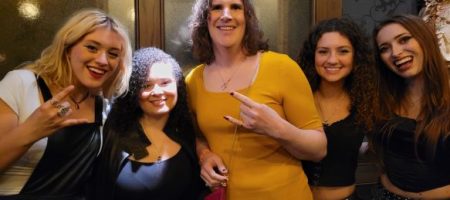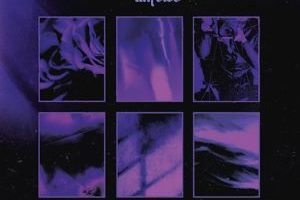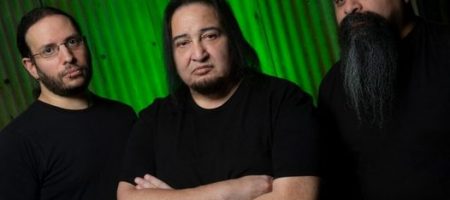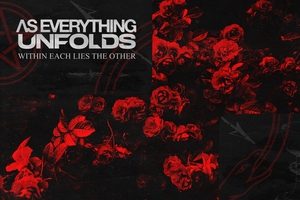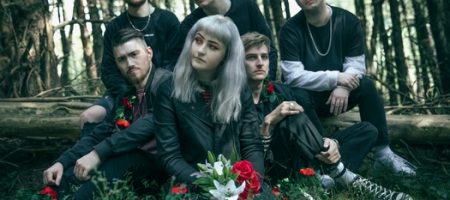As Everything Unfolds – Tinted in Ultraviolet
Thursday, 6th April 2023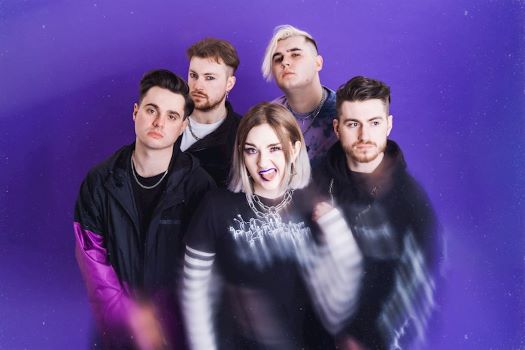
With their 2021 debut, Within Each Lies the Other, As Everything Unfolds was immediately thrust onto the musical map at full force. Full of raw emotions ranging from melancholy to anger, there was a genuine nature to the music that managed to grab you with one listen. It wasn’t surprising that they managed to grab quite a bit of success with their genreless approach, managing to appeal to fans of rock, metal, and potentially even pop music with equal parts. So the follow-up in Ultraviolet has high expectations, something that the band manages to smash with ease, focusing on even bigger hooks, riffs, and choruses, without losing that genuine emotional touch that the debut showcased. We spoke with vocalist Charlie Rolfe to get more of her insights about the new album, learnings from their debut, what she does outside of music and photography, and more.
Dead Rhetoric: You have released quite a few songs from the album already, just like with your previous album. Does it help keep you in the public eye for longer by spreading out the music?
Charlie Rolfe: Yeah, especially in this day and age, the way that people consume media, in general. The content, in general, whether it’s music, videos, all of that stuff. I find myself included in that too – if something doesn’t happen in the first 30 seconds, it’s like, just forget about it. It’s awful! It’s one of those things, as an artist, that’s really frustrating because you have to keep creating. But it does help you sort of stay active and be in people’s vision so they can understand where you are at. It’s good to keep on top of it.
The album is coming out later than it should have, so we really should have been releasing music way earlier than we had been. We are always constantly writing, so hopefully the wait won’t be that long before the next one.
Dead Rhetoric: Do you kind of use that as a gauge? Like the reaction to certain songs?
Rolfe: Definitely. With the first album, it was definitely like we learned from how people reacted to certain songs. We took that into the second album. Especially with the success of Within Each Lies the Other, we looked at the songs and asked what is it that people were really attracted to. We looked at the synth leads and the catchy hook choruses, and decided to take that and formulate songs around that idea. We didn’t stick to the same format every time, but it kind of gave us a baseline to work with.
Dead Rhetoric: I don’t know how much of this is on your end or the label, in terms of picking out pre-release songs, but is there a certain approach that is used? Like, deciding which ones would be best to release prior to the album?
Rolfe: We kind of have in our head what we would think. But again, learning from the first album, we didn’t invest in what ones we thought would be best until we had them all recorded and got them back. Interestingly, “Felt Like Home,” which was the first song we released, was going to be in the bin. That song was literally going to go in the [trash] bin. We kind of put in on the record because out of all the demos towards the end, and we thought it would sound alright once it had been properly recorded. I remember being in the studio – I was back in the airbnb and the boys were in the studio texting me and telling me that it sounded so good! I was like, “surely we aren’t talking about the same song,” but I went into the studio the next day and the producer was like, “you need to hear this!” It sounded completely different. It’s one of those things where we have an idea of what to do, but we don’t think too much about it.
In terms of the label, they tend to agree with much of what we pick. They might think a song might be better for a different reason, but we hear each other out and come up with something together.
Dead Rhetoric: So what else have you learned from Within Each Lies the Other that you applied to Ultraviolet?
Rolfe: The general writing process. With the first album, we went into the studio without a label and management. We had songs, and we just recorded them. We paid for it ourselves and it sort of happened. Some of it was a bit rushed, because we didn’t know what we were doing. This time around, it was a bit rushed because we didn’t book anything until we were 100% sure of what we wanted to do. We wanted all the songs pre-produced, we spent time working out all the harmonies, all the backing vocals – everything was done in the studio since Jon [Cassidy] is also our producer. So we worked everything out so that the demo basically just needed to be replicated. Obviously it makes it easier, and we did change a few things, but it meant we went in with a more competent product.
Dead Rhetoric: What can you say about the visual concept of ultraviolet as it relates to the album [promo pics/videos/etc]?
Rolfe: I have a degree in photography, so I spent a lot of time in the dark room. So I did a lot of printing, processing, and stuff like that – its very chemical and science based. To print in color, you have to expose it to ultraviolet light, so the idea of seeing life in full color, you have to expose that end of the spectrum. I thought it was interesting to bring that to a musical standpoint and take my two passions together. It gave us a baseline to work with, visually. It was also we could work with behind the scenes and gave us something to really get into with the whole mindset. With the samples on the tracks, they are from a dark room – I actually recorded them. People probably don’t know what’s going on, but for us, it’s a personal thing of bringing our own passions into the music.
Dead Rhetoric: So do you use your degree in photography in other areas of the band too?
Rolfe: I creatively direct pretty much everything. I always have people who can finalize the product and stuff like that, but all of the ideas. Like the photoshoots are thought up by me, but they are shot by someone else since I can’t do both of those things. Same with the videos – I come up with the concepts and work with someone. It’s the same for the artwork too. We now have a team of people that I can explain something to and they will understand what we are trying to do. I like being able to bring my creative aspects from the artsy side of me into the music as well, so I can live both of my passions out.
Dead Rhetoric: What do you like best about Ultraviolet? What are you proud of?
Rolfe: I think it just feels like a more mature product, since we spent more time on it. We were in a better place as a band. Behind the scenes, we were just growing as people. I’m just more proud of the product. It represents us more now, than the first album does. I love our first album dearly, but it’s a product of its time. It wasn’t a pandemic album, and it was recorded before COVID-19 was a thing, but it ended up being an album that people related to at that time. With this album, it’s a fresh palette. Everything is new and exciting. We tried to kind of do different things, like what I was saying, with the synth leads vs guitar leads and focusing on the hooks and choruses – developing our songcraft. That’s what I am most proud of, personally.
Lyrically, it is much less melancholy [laughs], which is nice, but it serves its purpose. But in general, we had this idea with this album that it needed to serve the song. That was the rule of thumb. Just because you want something to be there, doesn’t mean it is supposed to be there. Like a guitar solo – Adam [Kerr] would maybe put one in and we would all look at it to see if it served the song – did it work with it. We basically all decided on things as a unit. It wasn’t like, “well I wrote it, so it is there.” It was a group decision, and I feel like that was a very important thing that we learned as we moved forward, growing and changing.
Dead Rhetoric: The first album was kind of raw and honest. As you get more competent in ‘serving the song,’ how important is that continued theme of honesty and transparency in the music?
Rolfe: I think it is a fine balance. The more you work on something, the less genuine it can become. We do is we try to work on a song for a bit, and if it feels like it is getting stale, we leave it. We come back to it later. When you keep going over and over, you get so jaded to it. I feel like that is when you start to produce music that isn’t authentic, or it just doesn’t feel right. You are doing it for the sake of doing it. That was something we did. There were points where I just said, “I can’t do this song, let’s move onto the next one.” Then there were times I was doing three songs at the same time. So it is all about doing it when it’s right.
I go through weird phases when I write. I have six months of nothing, then I will have three months of continuous writing. Everyone has kind of learned my process by this point. If you change and force that, it’s not going to be genuine or raw, and all of those things that people really like in our music. Again, it’s just something we came across – don’t force what naturally happens and it just seems to work.
Dead Rhetoric: What’s your favorite song on the album, from a lyrical perspective?
Rolfe: Lyrically, I think one of my favorites is “Rose Bouquets,” which is actually like a farewell song to the first album. A lot of the imagery for the first album was roses and flowers, so I was in this weird zone in between releasing the first album and writing the next one. I needed to put a full stop or bookend it. So I decided to write a song about that. I like to drop little easter eggs here and there, people love it when you drop in things like that – old phrases and things that are familiar – it’s much more poetic lyrically, than something I would normally write. So I am quite proud of it. I had to step outside of my normal comfort zone to write.
Dead Rhetoric: What’s something that interests you outside of music and photography?
Rolfe: I’m not really sure. Just my general social life and whatever is going on day to day. I’m pretty boring [laughs]. I play a lot of video games, and watch a lot of films and TV. I’m very inspired by weird, fantasy stuff. That’s something I would like to dive into lyrically if I could. A lot of people find it really easy to write about that kind of stuff. I would like to do it as it’s another one of my passions – I spend hours listening to podcasts about Elder Scrolls lore, Lord of the Rings, and all that kind of stuff. I’m a massive nerd, so that’s something I would like to go into. Other than that, I’m pretty boring. I like my tea and my food, and that’s kind of me [laughs].
Dead Rhetoric: So what’s a game that you have been into lately?
Rolfe: I have been replaying The Forest in preparation for Sons of the Forest, as I haven’t played it in quite some time. I have been playing 7 Days to Die for years – I’m so far into it that it’s stupid. I’m committed to it. I play a lot of Switch, since we are traveling a lot. I play so many different games. I like fantasy and stuff like that, but I stick more to chill games to unwind. It’s more of an escapism thing.
Dead Rhetoric: With bands like Spiritbox experiencing a larger breadth of fans that your standard metal band, something you have in common with them, your music can hit a few different demographics without turning people off. Do you feel like there’s this untapped potential audience you can appeal to, outside of just metal?
Rolfe: I think that’s one thing that we always did like. None of are really massive metalheads. I would say that we are probably way heavier than we should be [laughs]. I really like the idea of being genreless. There’s this whole discourse about if genres really matter, and they do, to a broad degree – like rock or hip hop. But these more complicated subgenres – we get put into like post-hardcore or alt-metal. Wherever we get put, people are unhappy. We don’t care, but you find a lot of people on like Reddit forums where people share our music going, “This isn’t metal!” Then someone will post on a pop-punk one and people say, “This isn’t pop-punk!” Just chill out. Either enjoy it or don’t enjoy it. A lot of people ask us what we like being called. Whatever you think, then it’s that. We are not bothered. We aren’t very gatekeep-y about music. We all listen to pop music, and so many different kinds, so we aren’t funny about that.
Dead Rhetoric: So there’s a benefit in not being concerned about genre and boundaries, but what’s kind of the problem with that, at the same time?
Rolfe: People don’t know how to classify us, so they don’t really know where we fit. It’s weirdly positive and negative for shows. We get put on really heavy shows and the crowd isn’t into it, but then we are put on lighter line-ups and the crowd doesn’t want to hear that. We can’t be put into one thing, but it would be easier in some ways if we did, since fans would be able to find us. But in the longer term, I feel like what we are doing is more beneficial. We play to so many varied crowds. We are going out on Impericon, which is quite a heavy line-up with Thy Art is Murder and The Ghost Inside. Quite a lot of bands that we don’t fit with as much. Some people will probably call us ‘fake metal,’ but that’s totally fine [laughs].
Dead Rhetoric: If you could get out on the road and play with any band you would like, who would you play with?
Rolfe: We just have been out with a band called Enter Shikari, which we are all massive fans of. I have been a fan since I was like 12 or 13, so it’s a dream that we get to play with them. They are one of those bands that kind of fit anywhere – they can do heavy or light. I would love to play with My Chemical Romance, just on a personal level. I absolutely adore them, and I don’t think they get enough credit for who they actually are. It would be great to play with a band like Spiritbox, because I think tapping into that market would be really good. That’s hard one, since we are very chill about who we tour with – as long as people don’t hate us, and aren’t throwing things at us, we are fine [laughs].
Dead Rhetoric: Lastly, what are your plans for 2023?
Rolfe: In May, we are out with a band called Callejon from Germany. We are doing a few headline shows in a couple various places in Europe. Then we have a few festivals in the UK and Europe. Then in September we have two big headline shows in the UK in Manchester and London. Those will be a big deal for us since we haven’t done a UK headline show in a long time. It’s looking cooler. I’m excited. We have some other things for the end of the year that I can’t mention yet, but we are pretty much booked up until December!
As Everything Unfolds on Facebook











